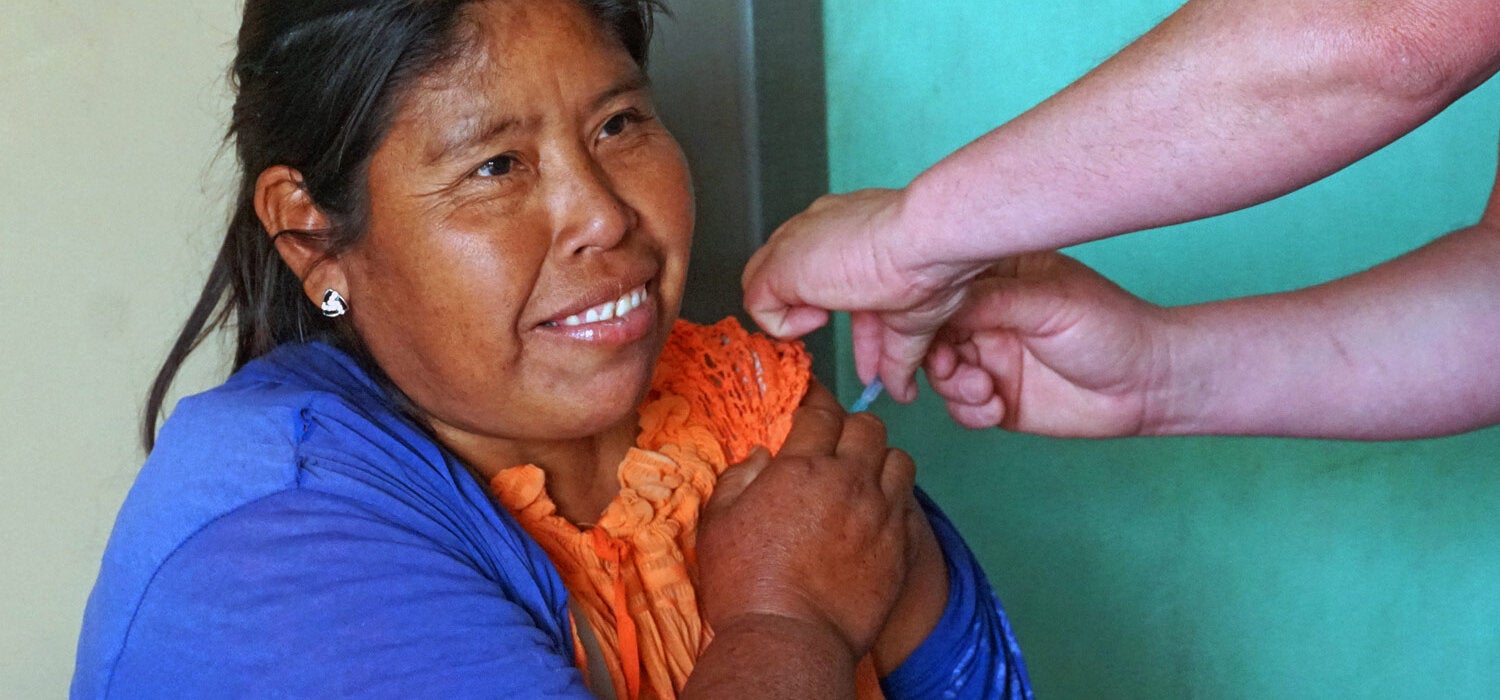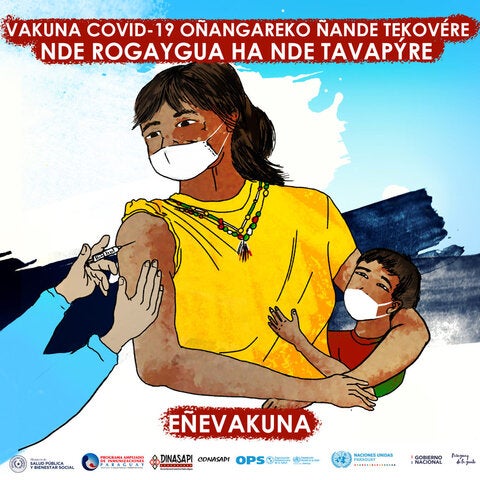August 9 2021
In the Nivaclé indigenous community "La Princesa," in the Department of Boquerón, located more than 500 kilometers from Asunción, the country's capital, Bernabé Desiderio, will receive the first dose of the COVID-19 vaccine. "I am not afraid to get vaccinated, I will have the antibodies against this disease that has caused so much pain and death to humanity. Now you can get vaccinated and save your life," says this health promoter who will bring vaccination messages to members of his community.
To encourage vaccination and continue promoting other measures to prevent infection, the Pan American Health Organization (PAHO) and the United Nations in the country launched a communication campaign coordinated with the National Directorate for the Health of Indigenous Peoples (DINASAPI) of the Ministry of Health and validated by the National Council for the Health of Indigenous Peoples (CONASAPI).
In that sense, the campaign messages considered the cosmovision of indigenous peoples, and placed the value of community health at its center.
"The COVID-19 vaccine protects the life of your family and your community. Get vaccinated." "COVID-19 vaccine protects life. Get vaccinated." "COVID-19 vaccine protects against severe forms of the disease. It is important to get vaccinated." These are some of the messages that can be read in the campaign materials and in different languages spoken in the country.
In Paraguay, the indigenous population is made up of around 120,000 people or 2% of the population. They belong to 19 peoples and live in 13 departments of the Eastern Region, Chaco and in Asunción, according to data from the last census of 2012. COVID-19 has also affected them since the arrival of the virus in the country. As of July 24, 2021, official data report that 459 people were infected and some 50 died as a result of the disease. People between 30 and 59 years of age are among the most affected.
Since the beginning of the pandemic, the Federation for the Self-Determination of Indigenous Peoples (FAPI) and other organizations, as well as indigenous leaders and representatives have promoted the implementation of non-pharmacological measures such as hand washing, use of masks and physical distancing, to prevent infection in the communities. DINASAPI has developed protocols for sanitary measures in the communities, which were validated with CONASAPI, made up of representatives and leaders of 19 indigenous peoples.
Paraguay began vaccinating people over 60 years of age, including indigenous people, against COVID-19 in April of this year, after vaccinating health personnel, following the prioritization of the government's Vaccination Plan. In Stage 2 of the plan, which began in July, vaccination efforts were intensified for all indigenous populations to ensure that youth, young adults, and pregnant women were included.
A collaborative effort
Indigenous communicators and organizations, as well as community radio stations, share the messages of the communication campaign in an effort to inform and protect this population, considered more vulnerable due to the inequities they face. Loud messages come out of the megaphones that travel the streets in remote communities.
An indigenous graphic designer also joined the initiative and a network of communicators collaborated in the translation and dissemination of materials in several languages: Guarani, Guarani ñandeva, Nivacle, Enlhet, Maka, Ache, Yshir Ybytoso, Ayoreo, Sanapaná and Qom.
Since the beginning of the pandemic, PAHO has provided cooperation to the country to ensure the safe operation of all vaccination centers, including the development of protocols and the purchase of more than 100 hand-washing sinks for the most vulnerable areas. The Organization also supported the modernization of the cold chain of Paraguay's Expanded Program on Immunization by providing it with temperature monitoring equipment at the national, regional and local levels, something that also benefits indigenous communities.
In addition, PAHO is providing support for the deployment of vaccination with indigenous populations in the Paraguayan Chaco region. This cooperation includes logistical support, transportation, equipment for vaccinators, computer equipment for the registration of vaccinated people, as well as materials with messages to raise awareness and encourage communities to get vaccinated.
The communities involved in this operation are located far from urban areas and health services, so mobile vaccination brigades were formed to reach the villages of different indigenous peoples of the Chaco. The teams are accompanied by community health promoters and community leaders in the three departments of the Paraguayan Chaco: Alto Paraguay, Boquerón and President Hayes. The objective: to leave no one behind in a life-saving vaccination campaign.
Links
Protecting the Health of Indigenous Peoples from COVID-19 in the Americas



